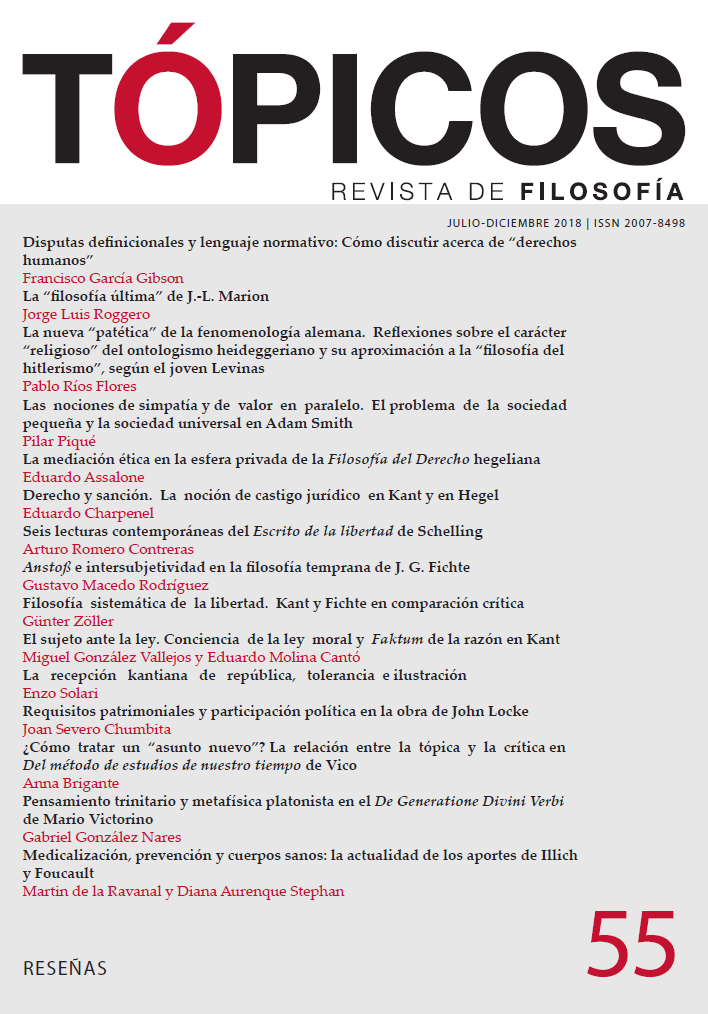Publicado 2018-06-08
Palabras clave
- Schelling,
- Karatani,
- Merleau-Ponty,
- quiasmo,
- paralaje
- lógica no-clásica,
- topología ...Más
Cómo citar
Resumen
El presente trabajo ofrece seis estrategias contemporáneas de lectura del Escrito de la libertad de Schelling. Se comienza presentando el problema fundamental del Escrito: la contradicción entre naturaleza y libertad; y entre fundamento y existencia. La posición del fundamento es de carácter ontológico y supone una relación jerárquica y necesaria entre sus términos. La segunda es ética y supone una relación de separación, no-necesaria y horizontal entre aquellos. Entonces: ¿cómo es posible pensar este “a la vez” de dos posiciones fundamentales irreconciliables? Para abordar este problema se propone una confrontación entre Schelling y Adorno respecto a los límites y posibilidades de toda filosofía no-identitaria. Finalmente, se ofrecen seis posibilidades de lectura del texto en cuestión que pueden ser agrupadas en: a) una perspectiva lógico-topológica (incluyendo lógicas no-clásicas y la teoría de nudos) y b) una perspectiva a través de cuatro pensadores contemporáneos: Karatani, Blondel, Merleau-Ponty y Günther y tres conceptos avanzados por ellos, profundamente emparentados entre sí, de paralaje, diplopía y quiasmo.
Descargas
Referencias
- Blondel, M. (1934). La Pensée. Vol. II. Les responsabilités de la pensée et la possibilité de son achèvement. Paris : Félix Alcan.
- Brunel, H. (2004). La felicidad Zen. Los más bellos cuentos Zen. Tr. Jerónimo Sahagún, Barcelona: El barquero.
- Chesterton, G.K. (2014). G.K. Chesterton: The Dover Reader. Mineola, Nueva York: Dover Thrift Editions.
- Derrida, J. (1972). Marges de la Philosophie. París: Les Editions de Minuit.
- Günther, G. (1953). The Logical Parallax. Astounding Science Fiction, LII (3), 123-133.
- Günther, G. (1980). Beiträge zur Grundlegung einer operationsfähigen Dialektik: Vol. III Band: Philosophie der Geschichte und der Technik. Wille, Schöpfung, Arbeit. Hamburgo: Meiner.
- Janke, W. (2008). Die Dreifache Vollendung des deutschen Idealismus: Schelling, Hegel und Fichtes ungeschribene Lehre. Fichte-Studien, Supplemementa (Band 22). Ámsterdan y Nueva York: Rodopi.),
- Kant, I. (1989), Sueños de un visionario, explicado por los ensueños de la metafísica. Edición crítica dcl texto alemán, introducción, traducción y notas de Cinta Canterla. Cádiz: Universidad de Cádiz.
- Karatani, K. (2003), Transcritique. On Kant and Marx. Trad. Sabu Kohso. Cambridge, Massachusetts y Londres, Inglaterra: The MIT Press.
- Lafont, C. (1993). La razón como lenguaje. Madrid: Visor.
- Leyte, A. (1998). Las épocas de Schelling, Madrid: Akal.
- Merleau-Ponty, M. (1964). Le visible et l'Invisible. Suivi de notes de travail. Texto establecido por Claude Lefort. París: Gallimard.
- Merleau-Ponty, M. (1995). La nature: Cours du Collège de France, notes. París: Éditions du Seuil.
- Nikhilananda, S. y Mukerji, D.G. (2011), Sri Ramakrishna. The face of silence, Ed. by Swami Adiswaranda. Mumbai: Jaico Publishing House
- Priest, G. (1995). Beyond the limits of thought. Cambridge: Cambridge University Press
- Rosenzweig, F. (1997). La Estrella de la Redención. Ed y trad. Miguel García-Baró. Sígueme: Salamanca.
- Schelling, F.W.J. (1948). Die Weltalter. Ed. M. Schröter. Múnich: Biederstein.
- Schelling, F. W. J. (1989). Investigaciones filosóficas sobre la esencia de la libertad humana y los objetos con ella relacionados. Ed y trad. de Helena Cortés y Arturo Leyte. Barcelona: Anthropos y Madrid: Ministerio de Educación y Ciencia.
- Schelling, F.W.J. (1998). Schelling's sämmtliche Werke (Edición en CD-Rom). Ed. E. Hahn. Berlin: Total Verlag.
- Schelling, F. W. J. (2002). Las edades del mundo. Textos de 1811 a 1815. Ed. Jorge Navarro Pérez. Madrid: Akal.






